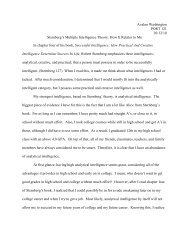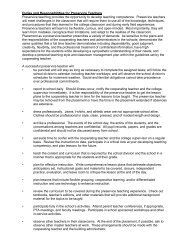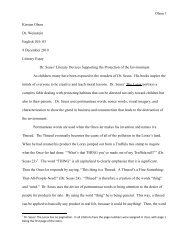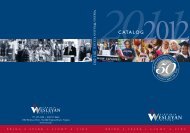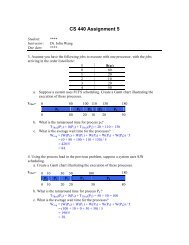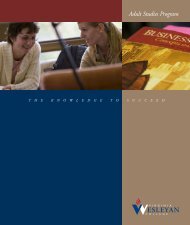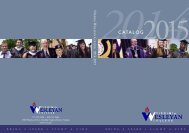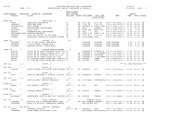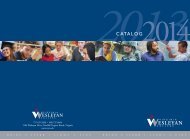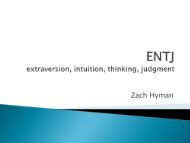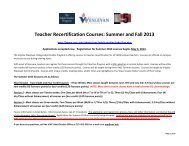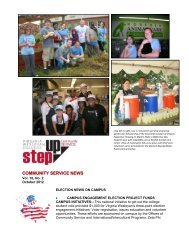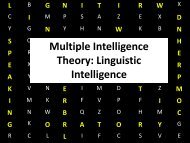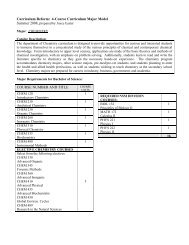2008-2009 Catalog - Virginia Wesleyan College
2008-2009 Catalog - Virginia Wesleyan College
2008-2009 Catalog - Virginia Wesleyan College
- No tags were found...
You also want an ePaper? Increase the reach of your titles
YUMPU automatically turns print PDFs into web optimized ePapers that Google loves.
RELIGIOUS STUDIES161how adherents of those traditions have responded to their“American” experience, as well as how religion generally hastransformed in a diverse and increasingly pluralisticenvironment. Offered each spring.157 Bible in American Culture/Life (4) (V)Focuses not on the content of the Bible but on thefunction of the Bible in American culture, politics, andsociety. Students examine such persons as Elizabeth CadyStanton and Thomas Jefferson and focus on distinctivelyAmerican types of biblical interpretation. Issues such asslavery, prohibition, and the Scopes trial are studied andhighlight how the Bible has been used and abused inarguments on social policies. By examining issues related topublishing and translating the Bible, some of the mostintense theological debates in American life are highlighted.Students also focus on how American laws shape theinfluence of the Bible in American life by highlightingcontemporary public educational contexts. Offered ondemand.217 The Old Testament World (4) (V)The ancient Israelites wrote stories of their past. Theypreserved laws. They wrote prophecies, biographies,common-sense advice, love poetry, and apocalypses. Thiscourse is an introduction to some of these writings;specifically, the writings preserved in the Old Testament(and in the Apocrypha). Thus, this course looks both at thehistory of the Hebrews and Israelites and—morespecifically—at the literature which they used to expressand communicate their faith. Prerequisite: at least threesemester hours in one or more of the following: English,history, philosophy, religious studies, general studies.Offered fall of odd-numbered years.218 The New Testament World (4) (V)The first Christians wrote letters to each other, theywrote tales about Jesus, they wrote sermons andapocalypses. This course is an introduction to some of thosewritings preserved in the New Testament, but also thoseapocryphal and non-canonical works which shaped how theNew Testament was remembered and how Christianitydeveloped. Thus, this course looks both at the earliestChristians (from a historical perspective) and—morespecifically—at the literature which they used to createcommunities and to express and communicate their faith.Prerequisite: at least three semester hours in one or more ofthe following: English, history, philosophy, religiousstudies. Offered each spring.232 Religion and American Politics (4) (V)Investigates the relationship between religion andpolitics in the United States, paying particular attention tothe role of traditional religious identities and issues, whilealso acknowledging non-traditional religious movements,ideas, and issues. Emphasis is placed on upcomingelections, and students are expected to be informed of thecurrent debates in the various national elections, which willform the basis of class discussions and studentpresentations. Identical to CSRF 232. Offered fall of evennumberedyears.251/351 Religion and Literature (3) (V)Works selected from the fiction, non-fiction, biographyand mythology of the world’s literature, both classic andmodern, academic and popular, and discussed from thepoint of view of belief, unbelief, values and spiritualorientation. Prerequisite: 251, none; 351, junior/seniorstatus or consent. Offered spring semester of oddnumberedyears.265 Extreme Religion:The Body, Pain, Sex andMartyrdom in Religious Experience (3) W(Winter Session)For the sake of their soul and their faith, religiousindividuals engage in a variety of actions which—in othercontexts—would be considered extreme: self-mutilation,snake-handling, fasting, celibacy, tantric sex, polygamy,suicide, martyrdom, etc. This course focuses on the role ofreligious experience; particularly on ecstatic or extremereligious expressions in world religions today. Afterexamining the roles and functions of “experience” withinreligion, this course focuses on specific examples (or casestudies) of “extreme” religious practices, seeking tounderstand their meaning and significance for thepractitioners of the religions themselves. Prerequisite: threesemester hours in one of the following: history, English,philosophy, or religious studies. Offered in selected WinterSessions.303 Saints and Heretics:Christian History I (4)(H)Through lecture and discussion of key primary texts,this course traces the “plot” of the development of Christianthought about questions of fundamental humanimportance from the formation of the medieval world tothe Reformation. We examine the mutual dependence oftheology and wider culture with special attention todeveloping strategies for reading the Bible. May be taken inconjunction with RELST 304 or independently.Prerequisite: at least three semester hours in one or more ofthe following: English, history, philosophy, religiousstudies. Offered fall of even-numbered years.304 Damned and Saved:Christian History II (4)(H)Through lecture and discussion of key primary texts,this course continues the “plot” of the development ofChristian thought. We trace the creation of our ownmodern world view from the wake of the Reformationthrough the Enlightenment and into the 19th and 20thcenturies. The focus is on the development of strategies forreading the Bible. As in RELST 303, we examine theinterrelation of theology and its cultural context at eachstep of the way. May be taken in conjunction with RELST303 or independently. Prerequisite: at least three semesterhours in one or more of the following: English, history,philosophy, religious studies. Offered spring of oddnumberedyears.



